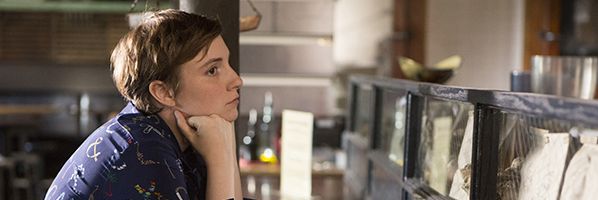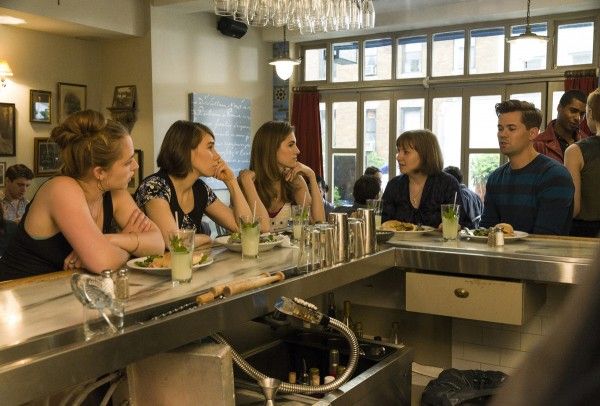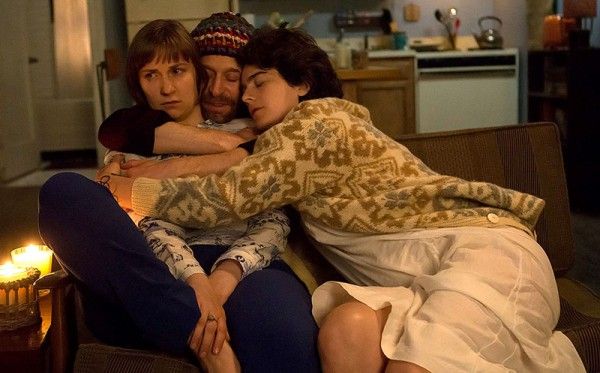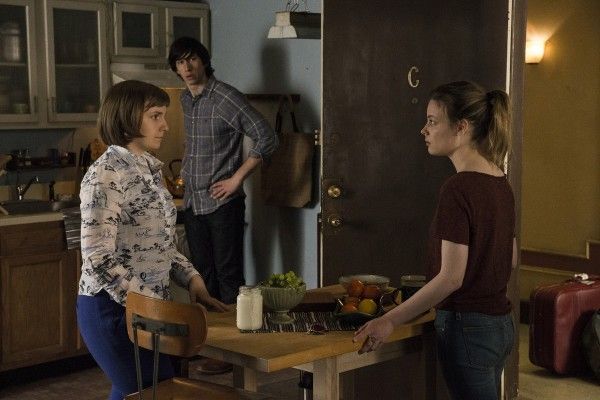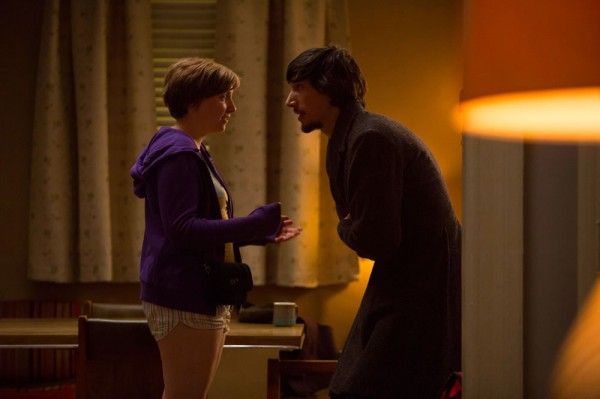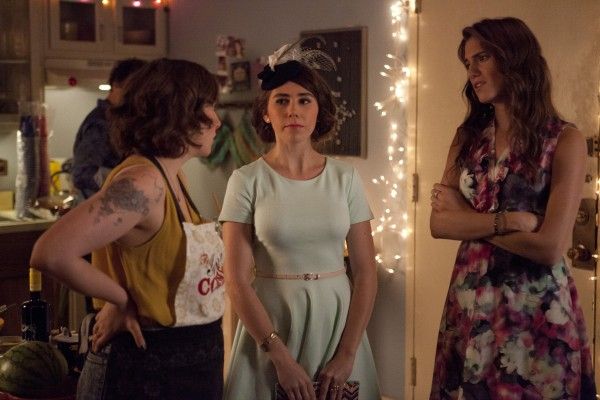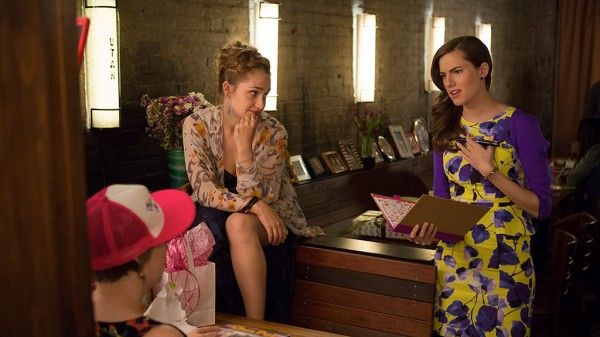It’s worth noting that one of the most heated debates I’ve ever been involved in regarding pop culture was focused on the fractious reception to the first season of Lena Dunham’s Girls. There I was, at a beer garden in Queens, NY, yelling against two of my oldest friends who insisted that Dunham, and her character, Hannah Horvath, were representative of everything wrong with the generation that we risibly refer to as the Millennials. The fact that the series at once accepted self-awareness as one of the defining elements of this generation, and suggested that self-awareness could, in itself, be a kind of self-important delusion made the show easy to dislike. Girls focused on people that were incredibly easy to deride and dislike, and in my opinion at the time, my friends had taken the obvious bait, hook, line, and sinker.
It’s ironic, then, to return to the beginning of the series and only see the basic seedlings of promise in the first season, and not much to like at all in the second season of Dunham’s HBO series, her sole follow-up to her hugely personal, very promising debut feature, Tiny Furniture, thus far. In retrospect, that the series offered a distinct and convincing view of the life of young women in arguably the most modern American city was the main emotional and intellectual pull of the series. It’s chasm between self-awareness and the performance of self-awareness was utilized primarily to proffer situations painted by tinny awkward humor; Dunham’s main goal felt like little more than delighting in the humiliation and striking self-involvement of her generation. And in the second season, the intensely gifted multi-hyphenate doubled-down on this concept, turning Girls into something like a less reflective variation on Curb Your Enthusiasm for struggling artistic types.
In the third season, however, there was finally a thrilling sense of how these people could wear on one another’s nerves, even if they remained self-obsessed in their own perspectives. In “Beach House,” one of the very best episodes of the series, the tensions between Hannah and her best friend, Marnie (Allison Williams), erupted in a remarkable, lacerating stand-off during a weekend trip, and Dunham, working with director Jesse Peretz (of Our Idiot Brother) and co-writers Judd Apatow and Jennifer Konner, made the entire episode into a stinging critique-cum-celebration of social performance, complete with dance routine to Harry Nilsson’s classic “You’re Breakin’ My Heart.” Beyond that, the season developed the storylines of Shoshanna and Jessa (Zosia Mamet and Jemima Kirke), specifically focusing on their erratic views of their professional lives.
There were moments in Season 3, including a few with lovely guest spots from June Squibb and Richard E. Grant, as well as the great Alex Karpovsky as the prickly Ray, that nodded towards maturation, for Hannah as well as the series itself. There were similar hints of growing up and abandoning pride when Shoshanna begged for Ray to take her back and when Marnie realized her effects on Desi’s (Ebon Moss-Bachrach) relationship; these personal moments of growth were balanced by uncertainty in careers, from schooling to Hannah’s job as a sponsored content writer at GQ. What remained a bit perplexing was the repetitive nature of Hannah’s relationship with the wild, unpredictable Adam (Adam Driver), her primary love interest throughout the series thus far. It’s not so much that the on-again-off-again relationship was unconvincing – everyone’s got a friend who’s been in this kind of situation - but more that the relationship never seemed to change in between the heated breaks.
When Adam blames Hannah for throwing him off his game with the news of her move to Iowa, the writing never suggests any sense that he’s been down this road with her before, nor did his decision to distance himself from her feel like much more than a need to elongate their particular part of the plot. Though this repetition grated my patience, it wasn’t exactly unforeseeable – Driver, one of the great actors of his generation, came into his own on Girls, and his unique delivery and remarkable physicality have been one of the great pleasures of the show from Season 1 on. To excise Driver from the show would be to lose one of its most galvanic elements, but in Season 3, his exchanges with Dunham’s character felt as if following a metronome, in stark contrast to Adam’s lively attempts to further his acting career on the stage.
The fourth season, however, quickly separated Adam and Hannah and kept them in a state of emotional acrimony throughout the season, going as far as to introduce a new, seemingly more mature partner for Adam, played with magnificent psychological acuity by Gillian Jacobs. On the other side of the coin, Hannah had seemingly found the seedlings of a real career as a high school teacher, which ultimately led her to a blossoming romance with a colleague, Fran (Jake Lacy). The writers and directors of the series also extended this sense of wisdom and ambition to Ray, who ran for office while settling into a managerial role at the hip café where he at first worked as a barista of sorts. In conflict with these advances, Shoshanna struggled to finally see the difference between knowing what you want and being indifferent to the real struggles of getting such things, while the tellingly named Marnie agreed to get engaged to an emotionally desperate Desi.
Season 4 ended with an oddly sweet and customarily intimate moment, with Hannah walking arm-in-arm with Fran, following Hannah and Adam’s umpteenth kinda-sorta breakup. As the fifth season opens, Fran and Hannah are themselves settling into a serious relationship, as Shoshanna prepares for a trip to Japan and Marnie gets ready for her wedding day. The narrative looks to leap into truly new territory for these characters, life beyond the friendships and relationships that are founded in college and in city living right after the degree.
As much as there’s some truth to the belief that true friends are what really matter in the end, it’s this push away from the central quartet of girlfriends that gave the last season such promise and could make the fifth season the best yet. Dunham and her creative team are reaching towards a kind of storytelling reminiscent of Robert Altman and, more expectedly, Apatow’s own gloriously loose and deeply human narratives, and by putting less stress on Hannah, Jessa, Marnie, and Shoshanna’s relationships to one another, the series is coming close to invoking a distinct kind of personal independence, a moving, genuine view of becoming something like an adult.
The danger here is in reverting to the old dramatic dynamics in the name of, once again, reminding the audience that things don’t turn out the way you think they will. The show has always flirted with a certain fetishizing of disappointment, as Girls has continuously averted anything that even vaguely resembles a happy ending or an easy resolution up until the end of Season 4. This dramatic tactic has served the series well thus far and has lent Girls an addictive kind of liveliness, a way of showing life as a series of letdowns that can serve as both detriments and crucial lessons, if one is willing to learn. At this point, however, this kind of structure, and the narrative decisions that come with it, has settled into a pattern as well, as expected in their skepticism and cynicism as the inherent optimism of a happy ending.
By offering fresh, steady narrative ground in Season 5, the series could bloom as it did in Season 3, branching out into changed characters and grappling with those changes without relapsing back to the central drama of the first season. A return to these exhausted dynamics, though, runs the danger of rendering Dunham’s exhilaratingly complex characters into what my friends were certain these characters were from the beginning: tired, overtly pre-conceived symbols of a clichéd view of Millennials as nothing more than self-obsessed and cowardly.
Girls Season 5 premieres Sunday, March 21st on HBO.

